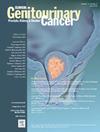老年转移性激素敏感前列腺癌患者是否从三重或双重治疗中获益?网络元分析。
IF 2.7
3区 医学
Q3 ONCOLOGY
引用次数: 0
摘要
随着雄激素受体轴靶向(ARAT)药物批准的扩大,临床医生现在有更多的治疗选择来为转移性激素敏感前列腺癌(mHSPC)患者提供治疗。老年人群是否也能从这些强化治疗方案中获益仍不确定。患者和方法:对随机对照试验(rct)进行了系统的数据库检索,以评估雄激素剥夺疗法(ADT)联合ARAT药物和/或多西他赛对老年mHSPC患者(年龄≥70或75岁)的疗效。主要终点是总生存期(OS)。使用随机效应网络荟萃分析估计可用治疗方案的间接比较。结果:共纳入11项rct。与单用ADT或ADT +多西他赛双药治疗相比,darolutamide + ADT +多西他赛的OS获益显著,风险比(hr)分别为0.47(95%可信区间[CI]: 0.28-0.77)和0.61 (95% CI: 0.40-0.93)。然而,另一个三联组(阿比特龙+ ADT +多西他赛)未能显示出统计学上显著的OS获益,hr分别为0.61 (95% CI, 0.37-1.02)和0.80 (95% CI, 0.52-1.24)。达罗他胺+阿比特龙三联疗法的疗效分别为0.90和0.67,P值分别为0.90和0.67,其次为达罗他胺+ ADT(0.61)、阿帕鲁他胺+ ADT(0.60)、恩杂鲁胺+ ADT(0.56)、ADT +多西他赛(0.40)、阿比特龙+ ADT(0.20)和单独使用ADT(0.06)。此外,我们的数据表明,将多西他赛添加到老年男性mHSPC的双联体和三联体治疗中有额外的益处。结论:在老年mHSPC患者中,由darolutamide, ADT和docetaxel组成的三联疗法显示出最明显的OS益处,并且在目前可用的治疗方案中排名最高。需要进一步的研究来探索与三联疗法相关的特定毒性,以便在做出治疗决定时更好地平衡肿瘤益处和治疗相关的毒性。本文章由计算机程序翻译,如有差异,请以英文原文为准。
Do Older Patients With Metastatic Hormone-Sensitive Prostate Cancer Benefit From Triplet or Doublet Therapy? A Network Meta-Analysis
Introduction
With the expanded approval of androgen receptor axis-targeted (ARAT) agents, clinicians now have more treatment options to offer patients with metastatic hormone-sensitive prostate cancer (mHSPC). Uncertainty remains as to whether older population could benefit similarly from these intensification treatment options.
Patients and Methods
A systematic database search was performed for randomized controlled trials (RCTs) evaluating the efficacy of androgen deprivation therapy (ADT) in combination with ARAT agents and/or docetaxel in older patients (aged ≥ 70 or 75 years) with mHSPC. The primary endpoint was overall survival (OS). Indirect comparisons of available treatment options were estimated using a random-effects network meta-analysis.
Results
A total of 11 RCTs were eligible. In comparison with ADT alone or ADT + docetaxel doublet, darolutamide + ADT + docetaxel showed a significant OS benefit, with hazard ratios (HRs) of 0.47 (95% confidence interval [CI]: 0.28-0.77) and 0.61 (95% CI, 0.40-0.93), respectively. However, another triplet (abiraterone + ADT + docetaxel) failed to demonstrate a statistically significant OS benefit, with HRs of 0.61 (95% CI, 0.37-1.02) and 0.80 (95% CI, 0.52-1.24), respectively. Triplet therapies comprising darolutamide and abiraterone ranked first and second, with P score of .90 and .67, respectively, followed by darolutamide + ADT (0.61), apalutamide + ADT (0.60), enzalutamide + ADT (0.56), ADT + docetaxel (0.40), abiraterone + ADT (0.20) and ADT alone (0.06). Furthermore, our data suggest an additional benefit from adding docetaxel as a component of doublet and triplet therapies for older men with mHSPC.
Conclusion
In older patients with mHSPC, triplet therapy comprising darolutamide, ADT, and docetaxel demonstrated the most pronounced OS benefit and ranked highest among currently available treatment options. Further studies are needed to explore the specific toxicities associated with the triplet regimen in this population to better balance oncologic benefits with treatment-related toxicities when making treatment decision.
求助全文
通过发布文献求助,成功后即可免费获取论文全文。
去求助
来源期刊

Clinical genitourinary cancer
医学-泌尿学与肾脏学
CiteScore
5.20
自引率
6.20%
发文量
201
审稿时长
54 days
期刊介绍:
Clinical Genitourinary Cancer is a peer-reviewed journal that publishes original articles describing various aspects of clinical and translational research in genitourinary cancers. Clinical Genitourinary Cancer is devoted to articles on detection, diagnosis, prevention, and treatment of genitourinary cancers. The main emphasis is on recent scientific developments in all areas related to genitourinary malignancies. Specific areas of interest include clinical research and mechanistic approaches; drug sensitivity and resistance; gene and antisense therapy; pathology, markers, and prognostic indicators; chemoprevention strategies; multimodality therapy; and integration of various approaches.
 求助内容:
求助内容: 应助结果提醒方式:
应助结果提醒方式:


